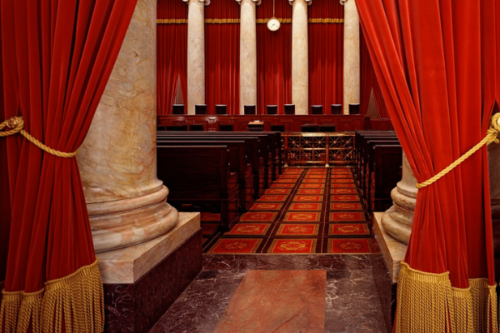
Podcast
So, Is It Fascism?
Jonathan Rauch joins the podcast to discuss why he now believes “fascism” accurately describes Trump’s governing style.
Feature
Scholars conclude terms limits would help restore ideological balance to the nation’s highest court
Writing in the Southern California Law Review, HKS Professor of Public Policy Maya Sen, along with University of Chicago’s Adam Chilton, and Daniel Epps and Kyle Rozema of Washington University in St. Louis, provide an assessment of the impact that various term limit proposals would have on the composition of the Supreme Court.
As public dissatisfaction with the Court has grown, so too has the chorus of reform proposals that would fundamentally reshape how justices are appointed. “Many have found the case for term limits persuasive: commentators, politicians across the political spectrum, and even the American public have all expressed support for term limits,” write Sen and her co-authors in Designing Supreme Court Term Limits. Term limits, proponents argue, would prevent Justices from retiring strategically in order to try to maintain their party’s ideological advantages on the Court.
While term limit proposals differ in important ways, such as how the transition to the new system would work, most would have Justices serve for eighteen years with their tenures staggered so that two appointments would be made each presidential term. Although term limits appear to enjoy broad bipartisan support and also to be gaining traction among some on Capitol Hill, many discussions have been silent on many key design decisions, such as what would happen should the Senate refuse to consider a president’s nomination. Further, few have studied how this proposal would affect the actual composition of the Supreme Court.
The authors believe there are four design choices for term limit proposals that policymakers should consider when drawing up eighteen-year term-limit plans:
Sen, Chilton, Epps, and Rozema find that term limits are likely to produce dramatic changes in the ideological composition of the Court. While life tenure ostensibly insulates justices from political pressure, the authors argue that “it also results in unpredictable deaths and strategic retirements determining the timing of Court vacancies.” The Supreme Court, for example, has had extreme ideological imbalance for sixty percent of the time since President Franklin Roosevelt’s effort to pack the Court. Any of the major term-limits proposals floated in recent years would have reduced the amount of time with extreme imbalance by almost half. “If the goal is to prevent the Supreme Court from becoming ideologically extreme, then term limits would probably do a very good job with that,” added Sen.
Written by Daniel Harsha, Associate Director of Communications and Strategic Initiatives
Podcast
Jonathan Rauch joins the podcast to discuss why he now believes “fascism” accurately describes Trump’s governing style.
Podcast
Drawing on new data from more than 10,000 Trump voters, this episode of Terms of Engagement unpacks the diverse constituencies behind the MAGA label.
Podcast
As Venezuela grapples with authoritarian collapse and a controversial U.S. operation that removed Nicolás Maduro, Freddy Guevara joins the podcast to discuss what Venezuelans are feeling and what democratic renewal might actually look like.
Article
Economists and policy analysts broadly agree that more housing needs to be built in order to reduce costs in America’s most expensive cities. Using a novel survey of mayors of mid-sized and large cities to explore mayors’ views on the roots of America’s housing crisis and what solutions they believe will most effectively address their constituents’ housing challenges, the authors summarize mayors’ attitudes and perceptions on key issues related to expanding the housing supply, reporting how well these views correlate with mayors’ assessments of their own cities’ supply needs.
Podcast
Jonathan Rauch joins the podcast to discuss why he now believes “fascism” accurately describes Trump’s governing style.
Podcast
Drawing on new data from more than 10,000 Trump voters, this episode of Terms of Engagement unpacks the diverse constituencies behind the MAGA label.


